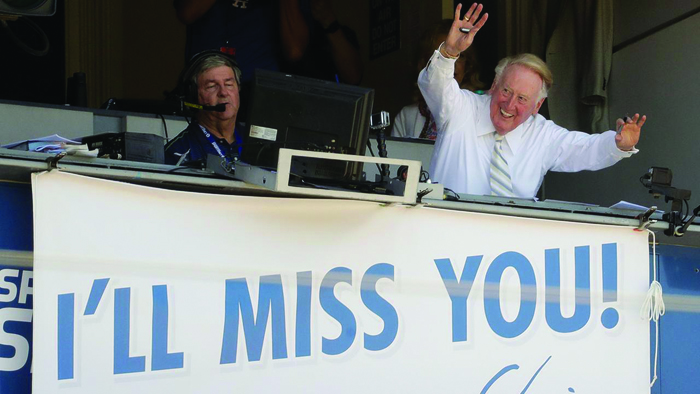When Vin Scully first started broadcasting Dodgers games in 1950, baseball had just desegregated. Mickey Mantle and Hank Aaron were the league’s MVPs and New York had three baseball teams. Dodgers games took place in Brooklyn, far from the current swashbuckling, free-spending Los Angeles iteration of the team. In those days, Vinnie’s voice was the city’s summer soundtrack, filling a city that buzzed during the peak of the American Dream.
Scully’s six-decade tenure, which comes to an end on Oct 2, seemed to knit baseball’s various epochs together. The red-haired, Bronx-Irish tenor’s perfectly-inflected words transformed each baseball game into a gripping, unfurling narrative.
During his Brooklyn Dodgers days, in the heyday of radio, Scully voiced the hopes of a whole borough with an eloquence surpassing his years. The young Scully was a recent Fordham graduate who had been in centrefield for the school team, while singing in a barbershop quartet and announcing football and basketball games. As soon as his voice rang out from the radio, Scully assumed the role of a familiar poet, an uncle-like figure to all those casually listening to a baseball game.
Scully’s simple, descriptive storytelling captured listeners’ attention as though he were sitting in the bleachers and chatting with them. Scully’s commentary—unlike conventional colour-commentary broadcasters who stay silent during plays and then evaluate after the fact—ranged from player anecdotes to historical events. Some commentators build walls of jargon in front of the listener, barring them from appreciating the raw beauty of the game. Scully, however, speaks as though he’s shooting the breeze with an old friend. His ability to see the humanity in baseball elevated him above most commentators stuck in a uniquely baseball frame of mind.
With the Dodgers’ move to California, Scully shifted from the working-class bustle of Brooklyn to the glitzy stage of Los Angeles. His move westward connected a nation by spreading baseball from the eastern seaboard to the Californian beaches. Scully wasn’t so much a commentator as a frontiersman spreading the story of baseball.
Scully’s timelessness rests in his extraordinary narrative ability. Of his repertoire, many incontrovertible touchstones of baseball history stand out: The Brooklyn Dodgers’ last championship in 1955, Sandy Koufax’s perfect game in 1965, Hank Aaron’s then record breaking 715th home run, to Fernando-mania, and of course, the “she is gone” Kirk Gibson home run in the 1988 World Series. He wears the laurel as baseball’s bard for a reason. He’s recorded baseball and American cultural history for generations of baseball fans. Grandparents are now telling their grandchildren about Vinnie from the Bronx, Vinnie from Brooklyn, and The Voice of the Dodgers.
On Sunday Sept. 25, Scully’s last home game entered the ninth with the Dodgers down 3-2 to the Rockies. On their last out, presumable NL Rookie of the Year Corey Seager ripped a homer to right field to tie the game and give Scully a chance at a storybook ending. In a game where Dodger stars all tipped their helmets to the retiring legend, the dramatic ending came courtesy of career backup Charlie Culberson hitting a walk-off tenth inning home run—his first in two years—to clinch the NL West title.
It was inevitable, the Baseball Gods wanted to give Scully a chance to commentate one last memorable moment.
When generations of young broadcasters look back for inspiration, there’s no doubt they’ll listen and learn from the greatest.
Check out what Jonah Keri had to say about Vin Scully in a Tribune exclusive podcast on mcgilltribune.com/sports
A former version of this article incorrectly stated that Brooklyn Dodgers's last World Series championship was in 1959. However, they moved to Los Angeles in 1957. Their last championship in Brooklyn was actually in 1955. The Tribune regrets this error.








